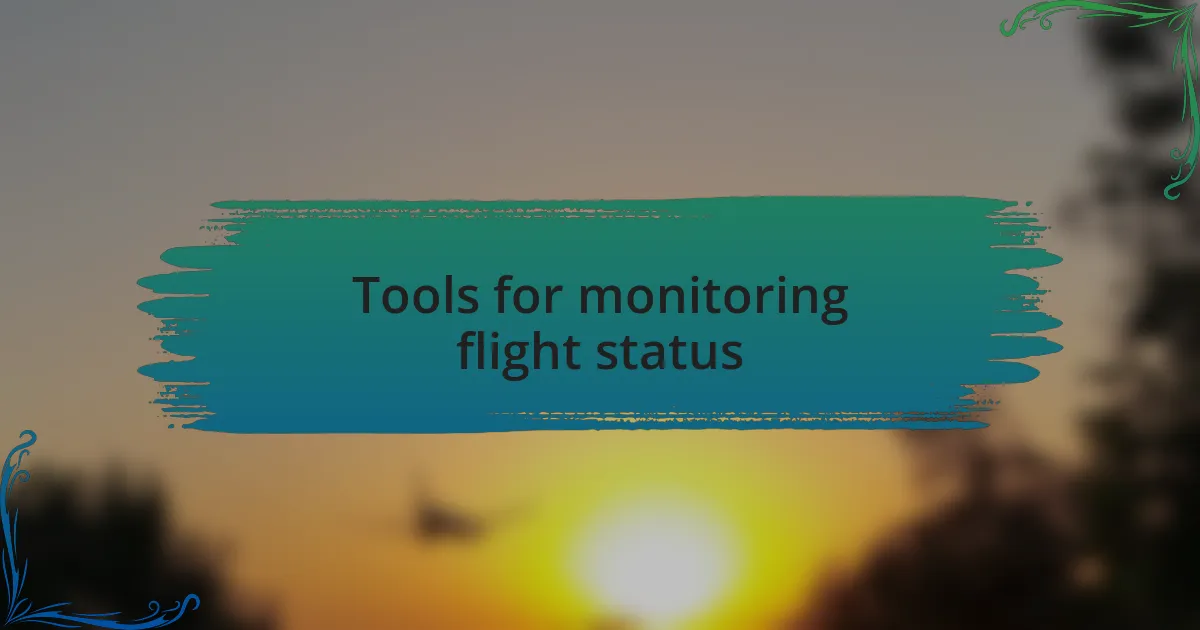Key takeaways:
- Flight changes can cause anxiety, but understanding airline procedures and rights can help manage stress and create opportunities for unexpected experiences.
- Proactive planning, including buffer times and staying updated via apps and alerts, can ease the impact of schedule changes.
- Maintaining a positive attitude and flexibility can lead to discovering new opportunities and forming good relationships with airline staff for better travel outcomes.

Understanding flight changes
Flight changes can happen for a variety of reasons, from weather conditions to operational adjustments. I recall a time when I was eagerly anticipating a trip to Thailand, only to receive a notification about a schedule change. It left me feeling anxious—would I miss my connecting flight? These moments can be stressful, but understanding the factors behind these changes helps to alleviate some of that uncertainty.
While it can be disheartening to face a sudden flight change, it’s essential to remember that airlines like Thai Airways typically prioritize passenger safety and operational efficiency. I’ve found that staying calm and informed makes all the difference. Have you ever thought about how a flexible mindset can turn what seems like a setback into an opportunity? Embracing that philosophy can lead to unexpected adventures, whether it’s discovering a new airport lounge or having an extra day to explore a new city.
I’ve also learned that being prepared for flight changes includes knowing your rights as a passenger. For example, do you know what compensation you might be entitled to if your flight is significantly delayed? I once experienced a lengthy delay and was surprised by the support offered by the airline. It’s moments like these that remind me of the importance of being an informed traveler.

Importance of planning ahead
Planning ahead is essential when it comes to flight changes. I remember a time when I meticulously mapped out my itinerary for a trip, only to find out a few days before departure that my flight had changed. That experience reminded me how crucial it is to have a backup plan. Have you ever been caught off guard by a change? It’s a learning moment for many travelers, highlighting the need for constant vigilance on flight schedules.
Additionally, when I factor in potential changes while booking my tickets, it allows me to remain more relaxed. I often leave buffer time in my schedule, knowing that delays can occur. It’s like preparing for a storm—if you’re equipped with the right tools and contingency plans, the impact can be limited. Have you considered how small adjustments can reduce your stress during travel?
Moreover, I’ve found that staying connected with the airline’s updates can transform a daunting experience into a manageable one. Utilizing apps and alerts keeps me informed and ready to adapt. I once received a notification while enjoying my coffee at the airport, allowing me to adjust my plans without panic. In those moments, proactive planning truly pays off.

Tools for monitoring flight status
When it comes to monitoring flight status, I swear by mobile apps. They offer real-time updates and notifications that can keep you informed at a moment’s notice. I remember a trip where I downloaded the Thai Airways app, and just minutes after I touched down at the airport, I received an alert about a slight delay—this gave me enough time to grab a quick bite without stress.
Websites like FlightAware and FlightRadar24 have also been game-changers for me. They provide a broader overview of flight statuses, including live tracking and historical data. I often check these sites when I’m picking someone up. Just last month, I used FlightAware to track a friend’s flight, which landed fifteen minutes early. I felt awesome pulling up at the perfect time, rather than playing the waiting game.
Don’t underestimate the power of social media either! Following airlines on platforms like Twitter can be incredibly useful. I recall a situation where I noticed a tweet from Thai Airways about an unexpected strike affecting flights. Thanks to that timely info, I was able to adjust my travel plans before scrambling last minute. Who knows how many travel hassles could be avoided simply by keeping an eye on social updates?

Personal strategies for adjusting plans
When it comes to adjusting my travel plans due to flight changes, I always keep an open mind and a flexible itinerary. There have been times when my flight got bumped, and instead of panicking, I took the opportunity to explore the airport’s amenities. I remember one rainy evening in Bangkok when I stumbled upon a cozy lounge and ended up enjoying a delicious meal that I wouldn’t have tried otherwise. Could a flight change actually lead to a hidden gem? I think so!
Another strategy I use involves revisiting my accommodation arrangements as soon as I hear about a flight delay or cancellation. On a recent trip to Chiang Mai, my flight was postponed by several hours. Instead of fretting, I contacted my hotel to adjust my check-in time. They were surprisingly accommodating, and it allowed me to make the most of my unscheduled time to revisit a favorite local café. Isn’t that a much better way to spend unexpected free time?
Lastly, I always make sure to have a backup plan for transportation. One time, after a delayed flight from Bangkok, I missed my booked airport transfer. Instead of being frustrated, I quickly grabbed a ride-sharing service on my phone. This not only saved me time but also helped me connect with the driver, who shared some fascinating tips about navigating the city. Have you ever considered how a simple change in plans could introduce you to unique experiences?

Lessons learned from past experiences
One key lesson I’ve learned from past travel experiences is the importance of maintaining a positive outlook. During a chaotic trip to Phuket, I experienced a significant flight delay that left me feeling frustrated. But instead of wallowing in disappointment, I decided to explore the local area near the airport. That small choice led me to a vibrant market, where I savored fresh tropical fruits and got a glimpse of the local culture. Would I have discovered that incredible market if my flight had gone smoothly? I doubt it.
Another vital insight is the necessity of building strong relationships with airline staff. On one occasion, I encountered a sudden flight cancellation with Thai Airways. Instead of merely expressing my discontent, I engaged with a customer service representative, sharing my travel story and asking for advice. The representative went above and beyond, not only securing me a new flight but also suggesting alternative routes that enhanced my journey. That interaction reminded me that a friendly demeanor can lead to unexpected solutions.
Flexibility also plays a crucial role in navigating flight changes. I recall a trip where a last-minute schedule shift meant I had to find new accommodation in Bangkok. I approached the situation with an open mind, ultimately discovering a quaint hotel with a lovely rooftop view that I would have otherwise overlooked. Have you ever found yourself in a situation where embracing change opened up new possibilities? I certainly have, and it has fundamentally shaped the way I approach travel.